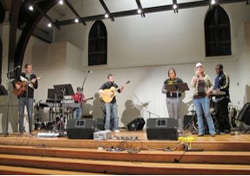
How you can change all of this?
Let’s start with the amp lover.
Your first level of assistance is showing them how they can point the amp up at their heads for a better sound.
Considering I’ve listed them in this article, it’s not going to be that simple.
Let’s say the musician does move it but still cranks the amp. Or, they don’t listen to your recommendations. Then what?
Talk with the worship leader. Explain the effect of the amp on the overall sound and its negative effect on the mix.
More than likely, the congregation is already unhappy with the sound. Give them a week or two. If nothing has changed, record the next service and give them a copy of the worship set after the service. They will hear for themselves how the amp is negatively affecting the mix and they’ll take steps to get that problem resolved.
Next, the stylizer.
Working with the stylizer is a bit harder. I haven’t found anything that I could say that would help. It was only in going to the worship leader that changes started to take place. Much the same way as with the guitarist, give them a copy of the worship set so they can hear the impact of the stylizer.
I suggest you go one step further. Recommend bringing in a vocal coach who isn’t someone who attends your church. Have that vocal coach attend a few services and then have them work with all of the singers.
This way, not only will the stylizer have a professional point out their issue and show them how to overcome it but the coach can help the other singers… and can’t everyone benefit from some level of professional instruction?
Finally, the double-duty musician.
This is the hardest of the three. Their heart is in the right place. My recommendation is that if you are good friends, sit down and have a heart-to-heart talk with them. A copy of the worship set might help but I’d focus on being honest with them.
You might say “whenever you sing lead for a song, your rhythm playing becomes inconsistent and the band feels it and the congregation hears it.” Or, “whenever you sing while playing, your singing volume is all over the place and sometimes, whether you realize it or not, you’ll not sing a couple of lines when you sing harmony.”
I’ve had to deal with this issue with a musician and it took a long time until they finally accepted it and committed to doing only one of the two for each song.
If you don’t think this will work, talk with the worship leader about it.
One other option
Sometimes problems don’t need to be solved directly. Sometimes it’s a matter of having the person in the right mindset to see what they need to change. Consider having a bible study with all the tech crew and the musicians together with a study on worship.
The result of the study can be an evaluation by each person as to how they work on the worship team to promote worship by the congregation and what they can do to improve.
In conclusion
Each of us, whether on the tech crew or on the worship team, are working for the congregation. Our goal is for them to worship completely and without distraction. Working behind the mixer is more than mixing and doing the technical work. It’s also about helping everyone reach that goal.
And, if you bring up one of these issues with the worship leader and it’s not dealt with over time, let it go. It’s their job to shepherd and lead the worship team, not yours.
Ready to learn and laugh? Chris Huff writes about the world of church audio at Behind The Mixer. He covers everything from audio fundamentals to dealing with musicians. He can even tell you the signs the sound guy is having a mental breakdown.
